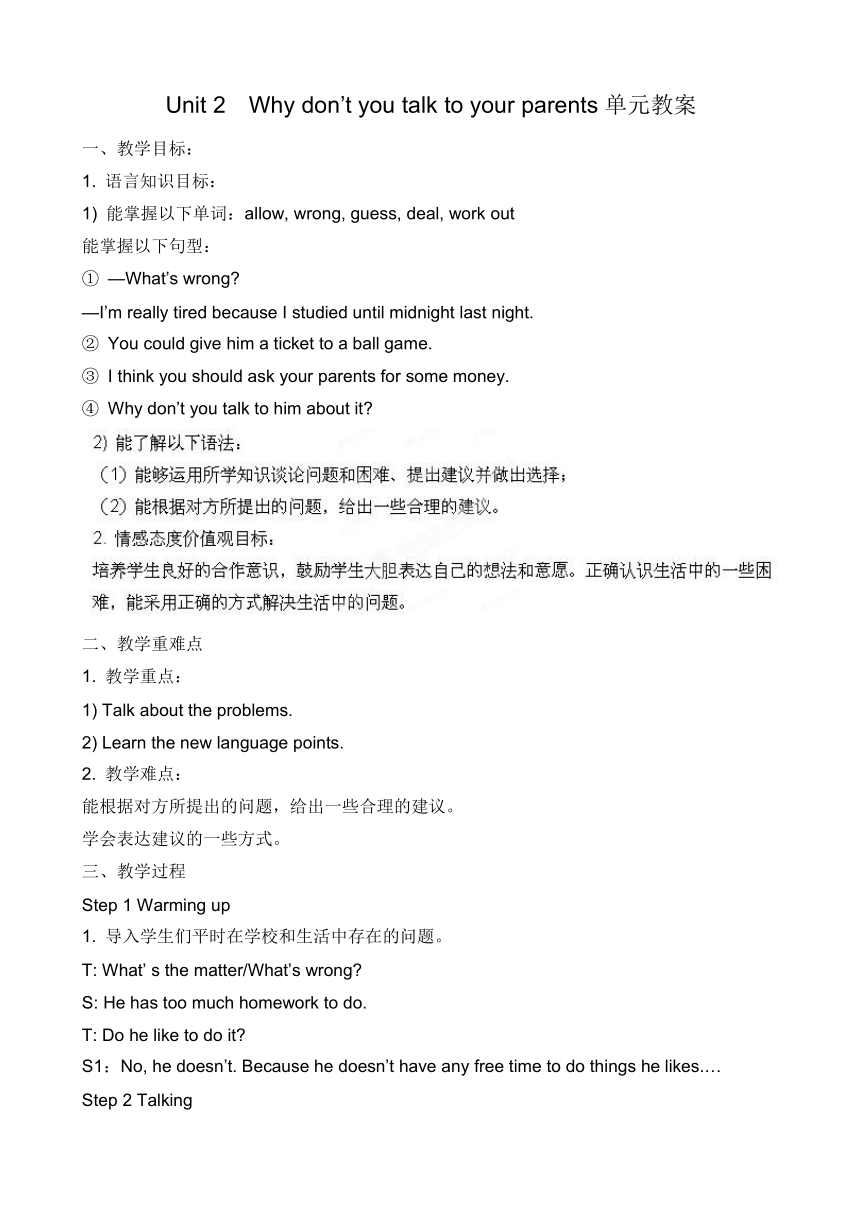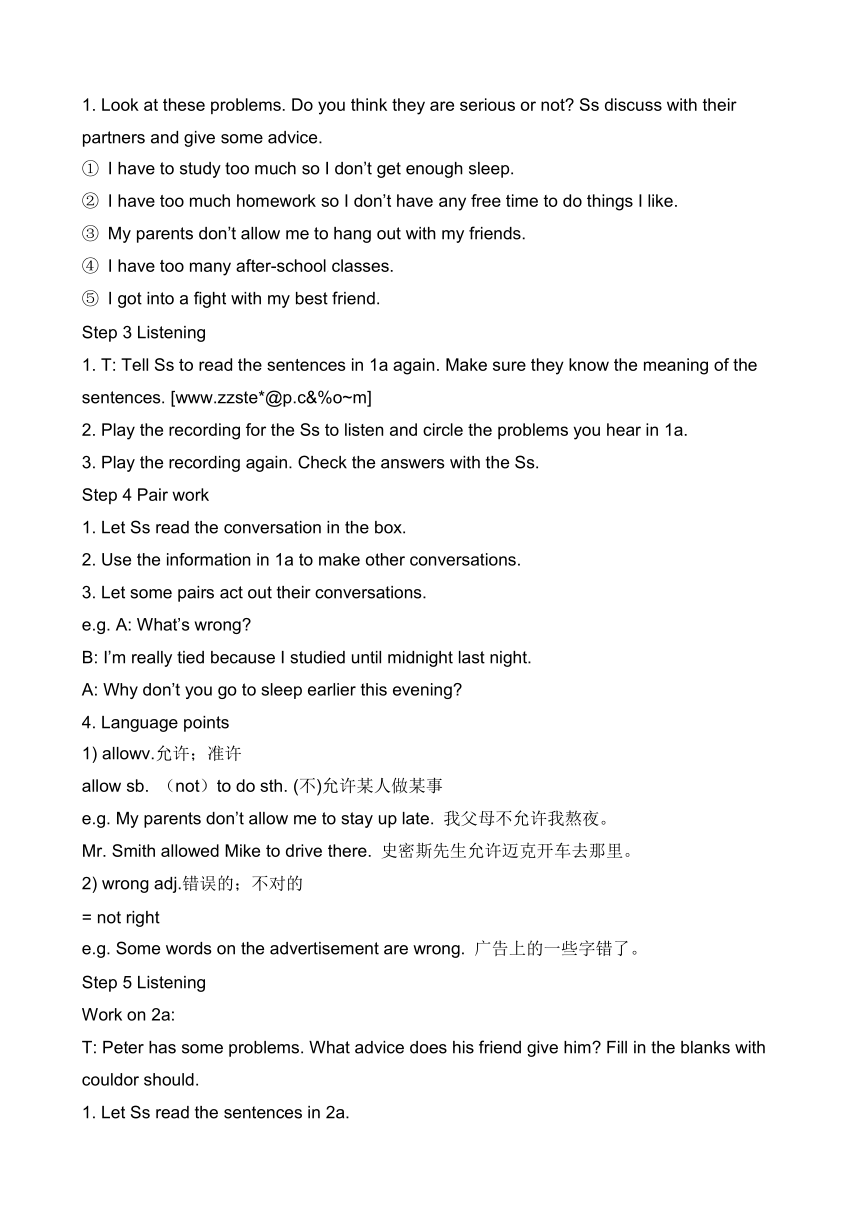Unit 2 Why don’t you talk to your parents教案
文档属性
| 名称 | Unit 2 Why don’t you talk to your parents教案 |

|
|
| 格式 | zip | ||
| 文件大小 | 49.0KB | ||
| 资源类型 | 教案 | ||
| 版本资源 | 鲁教版 | ||
| 科目 | 英语 | ||
| 更新时间 | 2015-10-17 00:00:00 | ||
图片预览


文档简介
Unit 2 Why don’t you talk to your parents单元教案
一、教学目标:
1. 语言知识目标:
1) 能掌握以下单词:allow, wrong, guess, deal, work out
能掌握以下句型:
① —What’s wrong
—I’m really tired because I studied until midnight last night.
② You could give him a ticket to a ball game.
③ I think you should ask your parents for some money.
④ Why don’t you talk to him about it
( http: / / www.21cnjy.com )二、教学重难点
1. 教学重点:
1) Talk about the problems.
2) Learn the new language points.
2. 教学难点:
能根据对方所提出的问题,给出一些合理的建议。
学会表达建议的一些方式。
三、教学过程
Step 1 Warming up
1. 导入学生们平时在学校和生活中存在的问题。
T: What’ s the matter/What’s wrong
S: He has too much homework to do.
T: Do he like to do it
S1:No, he doesn’t. B ( http: / / www.21cnjy.com )ecause he doesn’t have any free time to do things he likes.…
Step 2 Talking
1. Look at these problems. Do you think they are serious or not Ss discuss with their partners and give some advice.
① I have to study too much so I don’t get enough sleep.
② I have too much homework so I don’t have any free time to do things I like.
③ My parents don’t allow me to hang out with my friends.
④ I have too many after-school classes.
⑤ I got into a fight with my best friend.
Step 3 Listening
1. T: Tell Ss to read ( http: / / www.21cnjy.com ) the sentences in 1a again. Make sure they know the meaning of the sentences. [www.zzste*@p.c&%o~m]
2. Play the recording ( http: / / www.21cnjy.com ) for the Ss to listen and circle the problems you hear in 1a.
3. Play the recording again. Check the answers with the Ss.
Step 4 Pair work
1. Let Ss read the conversation in the box.
2. Use the information in 1a to make other conversations.
3. Let some pairs act out their conversations.
e.g. A: What’s wrong
B: I’m really tied because I studied until midnight last night.
A: Why don’t you go to sleep earlier this evening
4. Language points
1) allowv.允许;准许
allow sb. (not)to do sth. (不)允许某人做某事
e.g. My parents don’t allow me to stay up late. 我父母不允许我熬夜。
Mr. Smith allowed Mike to drive there. 史密斯先生允许迈克开车去那里。
2) wrong adj.错误的;不对的
= not right
e.g. Some words on the advertisement are wrong. 广告上的一些字错了。
Step 5 Listening
Work on 2a:
T: Peter has ( http: / / www.21cnjy.com )some problems. What advice does his friend give him Fill in the blanks with couldor should.
1. Let Ss read the sentences in 2a.
2. Play the recording for the Ss to listen and write the words in the blank.
3. Play the recording again to check the answers.
Work on 2b:
1. Let Ss read the sentences below. Explain some main sentences for the Ss. Make sure they know the meaning of each sentence.
2. Play the recordi ( http: / / www.21cnjy.com )ng for the Ss to write the letters (a-e) next to the advice in 2a.
3. Play the recording again to check the answers.
Answers: 1. d 2. e 3. a 4. c 5. b
Exercise:
Listen again. Fill in the blanks.
Boy 2 had a ______ with his best friend. He could ______ him a letter. But he isn’t good at writing letters. He ______ call him ____, but he doesn’t want to talk about it on the ______. He ______ talk to him so that he can say he’s sorry but it’s not ____. He ______go to his house but he doesn’t want to _______ him. He could take him to the _____________, but he doesn’t want to wait that long.
Step 6 Pair work
1. Tell Ss to mak ( http: / / www.21cnjy.com )e a conversation using the information in 2a and 2b.
2. Let one pair to read out their conversation first.
3. e.g. A: What’s the matter, Peter
B: I had a fight with my best friend. What should I do
A: Well, you should call him so that you can say you’re sorry.
B: But I don’t want to talk about it on the phone.
4. Ss act the con ( http: / / www.21cnjy.com )versation in pairs. Ask some pairs to act out their conversations.
Step 7 Role-play
1. Ss read the conversations and try to understand the meaning.
2. Read the conversation after the teacher.
3. Practice the conversation with their partner. Then let some pairs to act out the conversation.
4. Explain some new words and main points in the conversation.
(1) guess
e.g. Let us guess the height of the building. 让我们来猜一下这个建筑物的高度。
(2) big deal, deal
big deal是英语中的一个固定搭配,表示 ( http: / / www.21cnjy.com ) “重要的事情或状况”,多用于非正式交流。作否定用法时,常说It’s not a big deal或It’s no big deal.表示说话人并不认为某事有什么了不起。
e.g. There s a soccer game on TV this evening but I don’t have to watch it. It’s no big deal. 今天晚上电视上有一场足球赛,但我不一定要看。没什么大不了的。
It’s a big deal, David, bigger than you know.
这事挺重要的,戴维,比你所知道的要重要。
What s the big deal It’s only a birthday, not the end of the world.
有什么了不起的?这不过是个生日,又不是世界某日。
( http: / / www.21cnjy.com )
一、教学目标:
1. 语言知识目标:
1) 能掌握以下单词:allow, wrong, guess, deal, work out
能掌握以下句型:
① —What’s wrong
—I’m really tired because I studied until midnight last night.
② You could give him a ticket to a ball game.
③ I think you should ask your parents for some money.
④ Why don’t you talk to him about it
( http: / / www.21cnjy.com )二、教学重难点
1. 教学重点:
1) Talk about the problems.
2) Learn the new language points.
2. 教学难点:
能根据对方所提出的问题,给出一些合理的建议。
学会表达建议的一些方式。
三、教学过程
Step 1 Warming up
1. 导入学生们平时在学校和生活中存在的问题。
T: What’ s the matter/What’s wrong
S: He has too much homework to do.
T: Do he like to do it
S1:No, he doesn’t. B ( http: / / www.21cnjy.com )ecause he doesn’t have any free time to do things he likes.…
Step 2 Talking
1. Look at these problems. Do you think they are serious or not Ss discuss with their partners and give some advice.
① I have to study too much so I don’t get enough sleep.
② I have too much homework so I don’t have any free time to do things I like.
③ My parents don’t allow me to hang out with my friends.
④ I have too many after-school classes.
⑤ I got into a fight with my best friend.
Step 3 Listening
1. T: Tell Ss to read ( http: / / www.21cnjy.com ) the sentences in 1a again. Make sure they know the meaning of the sentences. [www.zzste*@p.c&%o~m]
2. Play the recording ( http: / / www.21cnjy.com ) for the Ss to listen and circle the problems you hear in 1a.
3. Play the recording again. Check the answers with the Ss.
Step 4 Pair work
1. Let Ss read the conversation in the box.
2. Use the information in 1a to make other conversations.
3. Let some pairs act out their conversations.
e.g. A: What’s wrong
B: I’m really tied because I studied until midnight last night.
A: Why don’t you go to sleep earlier this evening
4. Language points
1) allowv.允许;准许
allow sb. (not)to do sth. (不)允许某人做某事
e.g. My parents don’t allow me to stay up late. 我父母不允许我熬夜。
Mr. Smith allowed Mike to drive there. 史密斯先生允许迈克开车去那里。
2) wrong adj.错误的;不对的
= not right
e.g. Some words on the advertisement are wrong. 广告上的一些字错了。
Step 5 Listening
Work on 2a:
T: Peter has ( http: / / www.21cnjy.com )some problems. What advice does his friend give him Fill in the blanks with couldor should.
1. Let Ss read the sentences in 2a.
2. Play the recording for the Ss to listen and write the words in the blank.
3. Play the recording again to check the answers.
Work on 2b:
1. Let Ss read the sentences below. Explain some main sentences for the Ss. Make sure they know the meaning of each sentence.
2. Play the recordi ( http: / / www.21cnjy.com )ng for the Ss to write the letters (a-e) next to the advice in 2a.
3. Play the recording again to check the answers.
Answers: 1. d 2. e 3. a 4. c 5. b
Exercise:
Listen again. Fill in the blanks.
Boy 2 had a ______ with his best friend. He could ______ him a letter. But he isn’t good at writing letters. He ______ call him ____, but he doesn’t want to talk about it on the ______. He ______ talk to him so that he can say he’s sorry but it’s not ____. He ______go to his house but he doesn’t want to _______ him. He could take him to the _____________, but he doesn’t want to wait that long.
Step 6 Pair work
1. Tell Ss to mak ( http: / / www.21cnjy.com )e a conversation using the information in 2a and 2b.
2. Let one pair to read out their conversation first.
3. e.g. A: What’s the matter, Peter
B: I had a fight with my best friend. What should I do
A: Well, you should call him so that you can say you’re sorry.
B: But I don’t want to talk about it on the phone.
4. Ss act the con ( http: / / www.21cnjy.com )versation in pairs. Ask some pairs to act out their conversations.
Step 7 Role-play
1. Ss read the conversations and try to understand the meaning.
2. Read the conversation after the teacher.
3. Practice the conversation with their partner. Then let some pairs to act out the conversation.
4. Explain some new words and main points in the conversation.
(1) guess
e.g. Let us guess the height of the building. 让我们来猜一下这个建筑物的高度。
(2) big deal, deal
big deal是英语中的一个固定搭配,表示 ( http: / / www.21cnjy.com ) “重要的事情或状况”,多用于非正式交流。作否定用法时,常说It’s not a big deal或It’s no big deal.表示说话人并不认为某事有什么了不起。
e.g. There s a soccer game on TV this evening but I don’t have to watch it. It’s no big deal. 今天晚上电视上有一场足球赛,但我不一定要看。没什么大不了的。
It’s a big deal, David, bigger than you know.
这事挺重要的,戴维,比你所知道的要重要。
What s the big deal It’s only a birthday, not the end of the world.
有什么了不起的?这不过是个生日,又不是世界某日。
( http: / / www.21cnjy.com )
同课章节目录
- Unit 1 Could you please clean your room?
- Section A
- Section B
- Unit 2 Why don't you talk to your parents?
- Section A
- Section B
- Unit 3 What were you doing when the rainstorm came
- Section A
- Section B
- Unit 4 An old man tried to move the mountains.
- Section A
- Section B
- Unit 5 What's the highest mountain in the world?
- Section A
- Section B
- Unit 6 Have you read Treasure Island yet?
- Section A
- Section B
- Unit 7 Have you ever been to a museum?
- Section A
- Section B
- Unit 8 I've had this bike for three years.
- Section A
- Section B
